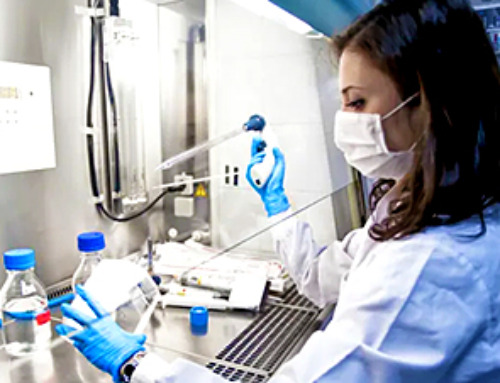New research on inflammation could lead to better treatments to improve outcomes for people with advanced or previously untreatable cancers.
Introducing bacteria to a tumour’s microenvironment creates a state of acute inflammation that triggers the immune system’s primary responder cells to attack rather than protect a tumour, according to researchers from UNSW Sydney and the Garvan Institute of Medical Research.
At the earliest signs of bacterial infection, the first cells on the scene are white blood cells called neutrophils, which play an important role in the defense against infection.
While they generally protect against disease, they are notorious for promoting tumour growth. High levels of them in the blood are typically associated with poorer outcomes in cancer, in part because they produce molecules that shield the tumour by suppressing the other elements of the immune system.
The team of scientists discovered that injecting inactivated samples of the Staphylococcus aureus microbe into the tumour microenvironment – the area surrounding the tumour – flips the protective function of neutrophils.
The research, published in the journal Cancer Research, was led by Associate Professor Tatyana Chtanova at UNSW’s School of Biotechnology and Biomolecular Sciences and Head of the Innate and Tumour Immunology Lab at Garvan. A/Prof Chtanova says that these findings have helped progress our understanding of acute inflammation to advance microbial therapy for cancer.
“In our study we sought to develop new immunotherapies that use different modes of action that could complement and enhance existing immunotherapies,” says A/Prof Chtanova.
“We show how acute inflammation can be harnessed to achieve ongoing anti-tumour function in immune cells. We also show how microbial therapy can be successfully combined with an existing type of therapy, known as checkpoint inhibitor therapy, to amplify anti-cancer capabilities.”
Exploring new ways of triggering the immune system to fight cancer
Working on a range of animal cancer models, including Lewis lung carcinoma, triple-negative breast cancer, melanoma and pancreatic cancer, the presence of bacteria stimulated the neutrophils to destroy the tumours.
“Using the immune system to fight cancer has been one of the biggest breakthroughs in cancer therapy in the last two decades, but currently immunotherapy for improving T cell function [another important type of white blood cell] doesn’t work for all types of cancer,” says A/Prof Chtanova.
“We decided to use a different type of immunotherapy that targets neutrophils, to understand how generating acute inflammation in the immunosuppressive tumour microenvironment affects outcomes.”
The team studied the tumours in real time using a unique imaging method known as intravital imaging.
“Since attacking bacteria is the reason for neutrophils’ existence, we had a good inkling that introducing bacteria would bring neutrophils to the site and activate them. We discovered that it’s very effective in getting them to kill the tumours, chewing up their matrix,” she says.
The study also found that on exposure to bacteria, neutrophils begin to secrete molecules that will attract fighter T cells as reinforcement.
“We’ve shown that microbial therapy is an effective booster for checkpoint inhibitor therapy. We hope this synergistic effect will ultimately lead to better treatments to improve outcomes for patients with advanced or previously untreatable cancers,” says first author of the study, Dr Andrew Yam, clinical medical oncologist at The Kinghorn Cancer Centre and PhD student at Garvan.
This study focused on primary tumours, the first tumour in the body. “So far we have shown that our microbial therapy can inhibit growth of primary tumours and can also protect against tumour recurrence, which is a major clinical challenge,” says A/Prof Chtanova. “This suggests that our microbial therapy is achieving not just short-term and localised, but long-lasting and systemic anti-tumour immunity.
“Our next step is to extend these findings to develop a pathway to treat cancers that have metastasized to different locations.”
News
This Vaccine Stops Bird Flu Before It Reaches the Lungs
A new nasal spray vaccine could stop bird flu at the door — blocking infection, reducing spread, and helping head off the next pandemic. Since first appearing in the United States in 2014, H5N1 [...]
These two viruses may become the next public health threats, scientists say
Two emerging pathogens with animal origins—influenza D virus and canine coronavirus—have so far been quietly flying under the radar, but researchers warn conditions are ripe for the viruses to spread more widely among humans. [...]
COVID-19 viral fragments shown to target and kill specific immune cells
COVID-19 viral fragments shown to target and kill specific immune cells in UCLA-led study Clues about extreme cases and omicron’s effects come from a cross-disciplinary international research team New research shows that after the [...]
Smaller Than a Grain of Salt: Engineers Create the World’s Tiniest Wireless Brain Implant
A salt-grain-sized neural implant can record and transmit brain activity wirelessly for extended periods. Researchers at Cornell University, working with collaborators, have created an extremely small neural implant that can sit on a grain of [...]
Scientists Develop a New Way To See Inside the Human Body Using 3D Color Imaging
A newly developed imaging method blends ultrasound and photoacoustics to capture both tissue structure and blood-vessel function in 3D. By blending two powerful imaging methods, researchers from Caltech and USC have developed a new way to [...]
Brain waves could help paralyzed patients move again
People with spinal cord injuries often lose the ability to move their arms or legs. In many cases, the nerves in the limbs remain healthy, and the brain continues to function normally. The loss of [...]
Scientists Discover a New “Cleanup Hub” Inside the Human Brain
A newly identified lymphatic drainage pathway along the middle meningeal artery reveals how the human brain clears waste. How does the brain clear away waste? This task is handled by the brain’s lymphatic drainage [...]
New Drug Slashes Dangerous Blood Fats by Nearly 40% in First Human Trial
Scientists have found a way to fine-tune a central fat-control pathway in the liver, reducing harmful blood triglycerides while preserving beneficial cholesterol functions. When we eat, the body turns surplus calories into molecules called [...]
A Simple Brain Scan May Help Restore Movement After Paralysis
A brain cap and smart algorithms may one day help paralyzed patients turn thought into movement—no surgery required. People with spinal cord injuries often experience partial or complete loss of movement in their arms [...]
Plant Discovery Could Transform How Medicines Are Made
Scientists have uncovered an unexpected way plants make powerful chemicals, revealing hidden biological connections that could transform how medicines are discovered and produced. Plants produce protective chemicals called alkaloids as part of their natural [...]
Scientists Develop IV Therapy That Repairs the Brain After Stroke
New nanomaterial passes the blood-brain barrier to reduce damaging inflammation after the most common form of stroke. When someone experiences a stroke, doctors must quickly restore blood flow to the brain to prevent death. [...]
Analyzing Darwin’s specimens without opening 200-year-old jars
Scientists have successfully analyzed Charles Darwin's original specimens from his HMS Beagle voyage (1831 to 1836) to the Galapagos Islands. Remarkably, the specimens have been analyzed without opening their 200-year-old preservation jars. Examining 46 [...]
Scientists discover natural ‘brake’ that could stop harmful inflammation
Researchers at University College London (UCL) have uncovered a key mechanism that helps the body switch off inflammation—a breakthrough that could lead to new treatments for chronic diseases affecting millions worldwide. Inflammation is the [...]
A Forgotten Molecule Could Revive Failing Antifungal Drugs and Save Millions of Lives
Scientists have uncovered a way to make existing antifungal drugs work again against deadly, drug-resistant fungi. Fungal infections claim millions of lives worldwide each year, and current medical treatments are failing to keep pace. [...]
Scientists Trap Thyme’s Healing Power in Tiny Capsules
A new micro-encapsulation breakthrough could turn thyme’s powerful health benefits into safer, smarter nanodoses. Thyme extract is often praised for its wide range of health benefits, giving it a reputation as a natural medicinal [...]
Scientists Develop Spray-On Powder That Instantly Seals Life-Threatening Wounds
KAIST scientists have created a fast-acting, stable powder hemostat that stops bleeding in one second and could significantly improve survival in combat and emergency medicine. Severe blood loss remains the primary cause of death from [...]





















